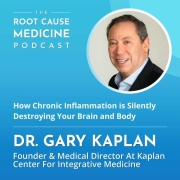Is Your Medication The Root Of Your Chronic Pain?
5 Pills That Might Be Hurting You
By Julia Westbrook
It’s time to stop ignoring the aches and pains and finally live a healthy life.
More Americans are suffering from chronic pain than have diabetes, according to a panel of researchers at the National Institutes of Health. While 29 million people are diagnosed with diabetes, the panel estimated that 100 million Americans live with chronic pain.
While the statistics are staggering, the scary truth is that, despite the apparent universality of pain, there isn’t nearly enough research on safe, effective treatments.
“We learned that sufficient clinical research doesn’t exist to show physicians how best to treat chronic pain in adults, many of whom suffer from multiple health problems,” said panel member and founding director of the Indiana University Center for Aging Research, Christopher Callahan, MD.
Instead, our medical system is heavily reliant on painkillers, both over-the-counter and prescription, despite the fact that, according to the panel, clinicians recognize that pain narcotics aren’t the solution for long-term pain treatment. (Here are 5 reasons over-the-counter painkillers are a bad idea.)
Gary Kaplan, DO, author of Total Recovery: Solving the Mystery of Chronic Pain and Depression, explains that medication—either for treating pains or treating other conditions—can be at the root of chronic pain. “Because of the powerful, short-term effectiveness of many drugs, we’re beginning to experience polypharmaceutical problems, where patients end up taking one drug to treat the side effects of other drugs,” he explains.
“The rough guideline I give my patients about taking medications is this: A drug has to work better than the side effects it creates,” he says. “If it doesn’t, get rid of it.” Of course, it’s important to do so under the supervision of your doctor, he adds.
While it’s easy to tune out the side-effect disclaimer on pharmaceutical ads, you may want to talk to your doctor if you’re experiencing chronic pain and are taking one of these prescriptions:
Statins
Statins are commonly used to lower cholesterol. “They can be the cause of cataracts and unexplained muscle pain. Some studies show they may increase your risk of developing diabetes,” says Dr. Kaplan.
Diet can have a big impact on cholesterol. Consider eating avocados, as research has shown that they’re a food that helps lower cholesterol.
Nonsteroidal Anti-Inflammatory Drugs (NSAIDs)
In the ultimate irony, your painkiller might be causing you more discomfort. “More than 70 percent of people chronically taking NSAIDs—such as ibuprofen (Advil, Motrin), naproxen (Naprosyn), diclofenac (Voltaren), and aspirin (Bayer, Bufferin)—will get ulcers in their small intestines, creating a permeability problem (aka leaky gut syndrome),” says Dr. Kaplan.
Leaky gut is associated with all kinds of painful issues, including food sensitivities, joint pain, headaches, and psoriasis.
Antibiotics
Speaking of your gut, taking antibiotics may be causing more painful inflammation than the infection itself. “Multiple treatments of antibiotics for any reason can profoundly change the gut flora,” says Dr. Kaplan. “Those changes can then damage the intestinal tract enough to create leaky gut syndrome, which will result in inflammation and activate the microglia.”
While he doesn’t dismiss the lifesaving importance of antibiotics, Dr. Kaplan recommends balancing their use with a probiotic supplement. And be sure to support a your gut bacteria with healthy foods.
Opioids
Another counterintuitive finding: Dr. Kaplan says that opioids can heighten your sensitivity to pain. “Additionally, these painkillers—such as codeine, hydrocodone (Vicodin), morphine (Avinza), and oxycodone (Percocet)—can lead to depression, constipation, and sexual dysfunction,” he says.
Instead of popping a pill for your pain, consider meditation as an effective treatment.
Sleeping Pills
Sleep is so important for your health, but popping a pill to get there isn’t the answer. “A chronic reliance on any type of sleeping pill—such as zolpidem (Ambien), eszopiclone (Lunesta), or zaleplon (Sonata)—can, in the short term, make it hard to focus and, in the long run, even shorten your life span,” says Dr. Kaplan. Plus, you might be missing key warning signs of sleep apnea.
Article reprinted from www.RodaleNews.com, Jan/2015











Leave a Reply
Want to join the discussion?Feel free to contribute!